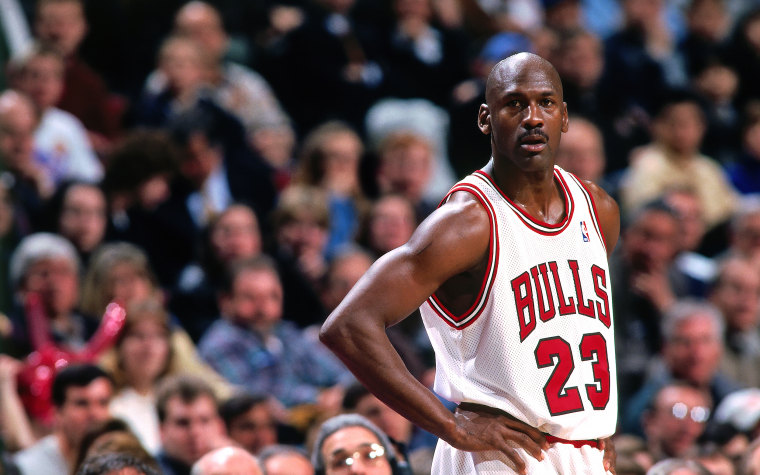Here's something I never thought I would say: I think I've had enough of Michael Jordan.
Like any Gen Xer worth his or her salt, telling everyone younger than me how Michael Jordan is and always will be the greatest of all time has been my pastime for two decades. But after 10 episodes of Michael Jordan himself making this case, I'm exhausted. "The Last Dance," which concluded its 10-episode run on Sunday night, is finally over. And I'm sure I'll remember the Sunday oasis of each new episode — the only real sports of this pandemic. But the show itself? I have a feeling that the only memory I'll have is of Jordan smirking.
The doc paints a portrait of an NBA superstar who is a deeply flawed, seemingly deeply unhappy man.
The doc paints a portrait of an NBA superstar who is a deeply flawed, seemingly deeply unhappy man who became the greatest ever by combining incredible basketball skill, an unquenchable work ethic and a borderline personality disorder. Man, I loved watching him play. But by the finale, when he was inventing yet another fake villain for a ridiculous, fanciful conspiracy theory that his famous 1997 "flu game" was the result of Jazz fans' poisoning his pizza, I was ready for Jordan to go back to the memory bin for a while. Nostalgia is a nice place to visit, but you don't want to live there.
Want more articles like this? Follow THINK on Instagram to get updates on the week's most important cultural analysis
Indeed, these final two episodes made it clear what the first eight hinted at: There is no mystery to Michael Jordan. He is a one-dimensional character: exacting, bullying, brilliant and insatiable, a man who cared about winning so much, and only about winning, that there was no room for anything or anyone else in his life.
Name one thing about, oh, Jordan's family after watching "The Last Dance." Or his emotional inner life. Or any biographical detail outside of basketball. Where did he go to relax? Did he ever worry that he hurt people? Did he have a dog? "The Last Dance" is 10 hours of Jordan-endorsed and -approved hagiography, to be sure, but I'm not sure it could have ever been anything else. Director Jason Hehir had a void at his film's center, and the only thing he could fill it with was hazy remembrance.
In a terrific piece at Slate, Joel Anderson argues that the overarching point of "The Last Dance" — and, indeed, of Jordan's biography — is that "he was always alone." (Anderson clearly remembers Jordan's unsuccessful denouement with the Washington Wizards more than "The Last Dance" does; the series never mentions it, likely because it failed so dramatically.) It's tough to blame the director, despite having so much access to Jordan, for not having any new insights. Jordan might not be capable of insight on anything other than his own dominance.
Perhaps this singular focus is what made him such an incredible basketball player; Jordan certainly thinks so. The film's only real emotional moment is when he cries ... because he wants to win so badly. But it also keeps Jordan separate from the rest of the human race. That's a fascinating idea for a documentary — is Jordan an alien? But only if Jordan had enough self-awareness to allow anyone to explore it.
Clearly, that was never going to happen with "The Last Dance." As Anderson put it: "Jordan sincerely didn't give a s--- about anything but the scoreboard." That's a perfectly reasonable way for an athlete to be, and frankly that mindset is exactly what I want from an athlete when he's playing for the team I'm rooting for. (It's another reason I miss live sports so much.)
Jordan hasn’t played a game for the Bulls in more than 20 years. The cumulative effect of the documentary feels a little bit like another '90s staple: whippets.
But Jordan hasn't played a game for the Bulls in more than 20 years. The cumulative effect of the documentary feels a little bit like another '90s staple: whippets. You get an undeniable contact high and feel exceedingly giddy for a short period of time. But you've killed a ton of brain cells and won't end up remembering much about the experience anyway.
There's a remarkable moment at the end of the finale when Jordan, later on in the night he won that sixth title, plays piano for his entourage looking happier than any person should ever look. You realize, even if the 1998 Jordan does not, that this is the end: He'll never win another title, he'll never have such total dedication, he'll never be adored as much again. You sense that Jordan wants the night to last forever. With this documentary, you see that, over the last 20 years, this is exactly what he's been trying to do: to recapture that magic. But the dance is, actually, over.
I had a blast reliving some of those old Chicago moments. But only for a while. Eventually, hearing someone talk incessantly about the past is more about the person telling the story than the person hearing it. Michael Jordan had his time. And it was a great time. And while I'm glad it happened, I'm also ready to move on. I hope, for his sake, that someday Jordan will be able to, as well. But I wouldn't bet on it.
Related:

